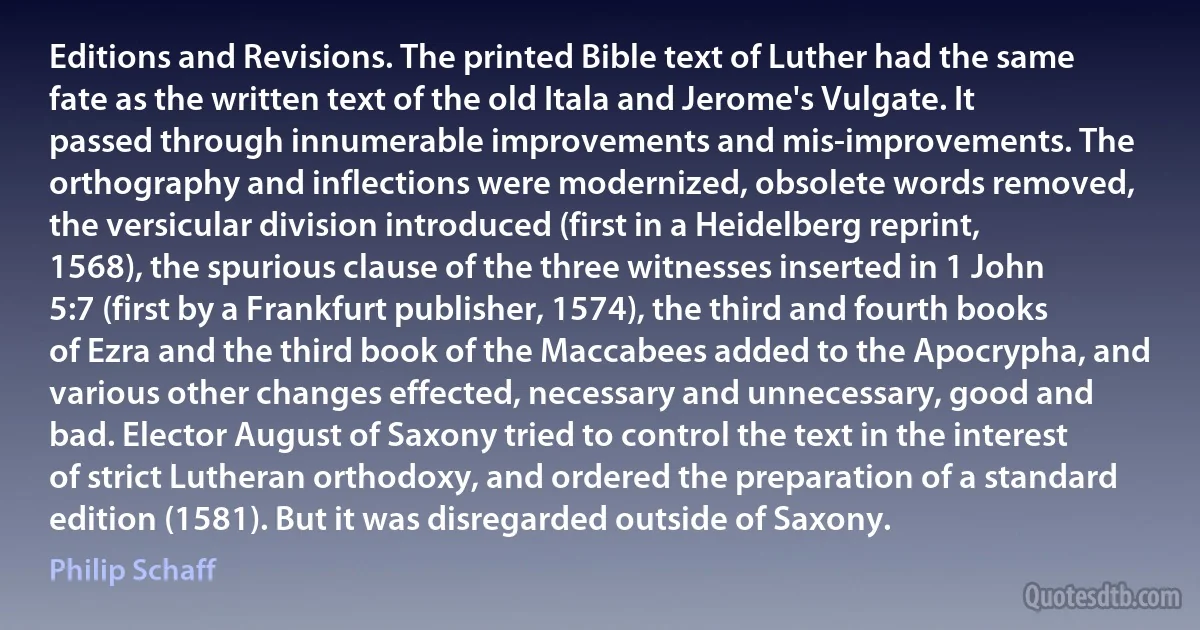Philip Schaff quotes
The spread of this version, imperfect as it was, proves the hunger and thirst of the German people for the pure word of God, and prepared the way for the Reformation. It alarmed the hierarchy. Archbishop Berthold of Mainz, otherwise a learned and enlightened prelate, issued, Jan. 4, 1486, a prohibition of all unauthorized printing of sacred and learned books, especially the German Bible, within his diocese, giving as a reason that the German language was incapable of correctly rendering the profound sense of Greek and Latin works, and that laymen and women could not understand the Bible. Even Geiler of Kaisersberg, who sharply criticised the follies of the world and abuses of the Church, thought it "an evil thing to print the Bible in German."

Philip Schaff
Luther could not be ignorant of this mediaeval version. He made judicious use of it, as he did also of old German and Latin hymns. Without such aid he could hardly have finished his New Testament in the short space of three months. But this fact does not diminish his merit in the least; for his version was made from the original Hebrew and Greek, and was so far superior in every respect that the older version entirely disappeared. It is to all intents a new work.

Philip Schaff
Earlier Versions. Luther was not the first, but by far the greatest translator of the German Bible, and is as inseparably connected with it as Jerome is with the Latin Vulgate. He threw the older translation into the shade and out of use, and has not been surpassed or even equaled by a successor. There are more accurate versions for scholars (as those of De Wette and Weizsäcker), but none that can rival Luther's for popular authority and use.
The civilization of the barbarians in the dark ages began with the introduction of Christianity, and the translation of such portions of the Scriptures as were needed in public worship.
The Gothic Bishop Wulfila or Wölflein (i. e., Little Wolf) in the fourth century translated nearly the whole Bible from the Greek into the Gothic dialect. It is the earliest monument of Teutonic literature, and the basis of comparative Teutonic philology.

Philip Schaff
He adapted the words to the capacity of the Germans, often at the expense of accuracy. He cared more for the substance than the form. He turned the Hebrew shekel into a Silberling, the Greek drachma and Roman denarius into a German Groschen, the quadrans into a Heller, the Hebrew measures into Scheffel, Malter, Tonne, Centner, and the Roman centurion into a Hauptmann. He substituted even undeutsch (!) for barbarian in 1 Cor. 14:11. Still greater liberties he allowed himself in the Apocrypha, to make them more easy and pleasant reading. He used popular alliterative phrases as Geld und Gut, Land und Leute, Rath und That, Stecken und Stab, Dornen und Disteln, matt und müde, gäng und gäbe.

Philip Schaff
The Original Text. The basis for Luther's version of the Old Testament was the Massoretic text as published by Gerson Ben Mosheh at Brescia in 1494. (although he disliked him exceedingly on account of his monkery), the Latin translations of the Dominican Sanctes Pagnini of Lucca (1527), and of the Franciscan Sebastian Münster (1534), the "Glossa ordinaria" (a favorite exegetical vade-mecum of Walafried Strabo from the ninth century), and Nicolaus Lyra (d. 1340), the chief of mediaeval commentators, who, besides the Fathers, consulted also the Jewish rabbis.Lyra acquired by his Postillae perpetuae in V. et N. Test. (first published in Rome, 1472, in 5 vols. fol., again at Venice, 1540) the title Doctor planus et utilis. His influence on Luther is expressed in the well-known lines:
:"Si Lyra non lyrasset,
:Lutherus non saltasset."
The basis for the New Testament was the second edition of Erasmus, published at Basel in Switzerland in 1519.

Philip Schaff
The Romanists were forced in self-defense to issue rival translations. Such were made by Emser (1527), Dietenberger (1534), and Eck (1537), and accompanied with annotations. They are more correct in a number of passages, but slavishly conformed to the Vulgate, stiff and heavy, and they frequently copy the very language of Luther, so that he could say with truth, "The Papists steal my German of which they knew little before, and they do not thank me for it, but rather use it against me."

Philip Schaff
During the fourteenth century some unknown scholars prepared a new translation of the whole Bible into the Middle High German dialect. It slavishly follows the Latin Vulgate. It may be compared to Wiclif's English Version (1380), which was likewise made from the Vulgate, the original languages being then almost unknown in Europe. A copy of the New Testament of this version has been recently published, from a manuscript in the Premonstratensian convent of Tepl in Bohemia. Another copy is preserved in the college library at Freiberg in Saxony.

Philip Schaff
Earlier Versions. Luther was not the first, but by far the greatest translator of the German Bible, and is as inseparably connected with it as Jerome is with the Latin Vulgate. He threw the older translation into the shade and out of use, and has not been surpassed or even equaled by a successor. There are more accurate versions for scholars (as those of De Wette and Weizsäcker), but none that can rival Luther's for popular authority and use.

Philip Schaff
Luther's Qualifications. Luther had a rare combination of gifts for a Bible translator: familiarity with the original languages, perfect mastery over the vernacular, faith in the revealed word of God, enthusiasm for the gospel, unction of the Holy Spirit. A good translation must be both true and free, faithful and idiomatic, so as to read like an original work. This is the case with Luther's version. Besides, he had already acquired such fame and authority that his version at once commanded universal attention.

Philip Schaff
The German Rendering. The German language was divided into as many dialects as tribes and states, and none served as a bond of literary union. Saxons and Bavarians, Hanoverians and Swabians, could scarcely understand each other. Each author wrote in the dialect of his district, Zwingli in his Schwyzerdütsch. "I have so far read no book or letter," says Luther in the preface to his version of the Pentateuch (1523), in which the German language is properly handled. Nobody seems to care sufficiently for it; and every preacher thinks he has a right to change it at pleasure, and to invent new terms." Scholars preferred to write in Latin, and when they attempted to use the mother tongue, as Reuchlin and Melanchthon did occasionally, they fell far below in ease and beauty of expression.

Philip Schaff



